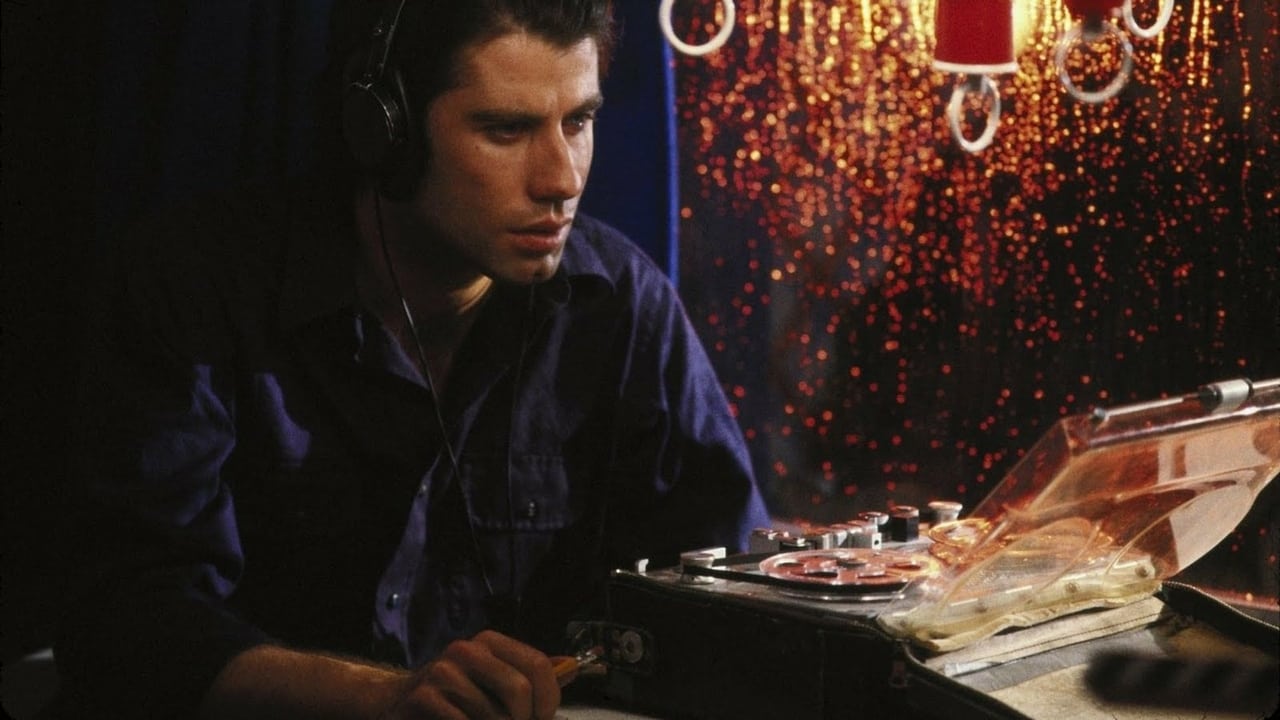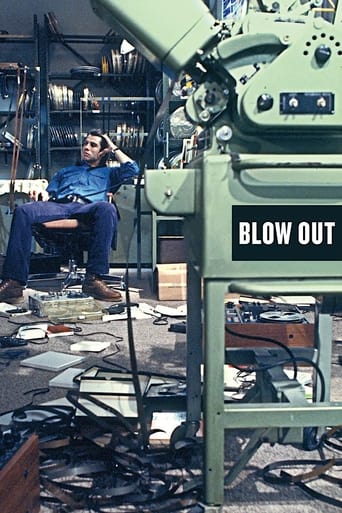Myron Clemons
A film of deceptively outspoken contemporary relevance, this is cinema at its most alert, alarming and alive.
Aneesa Wardle
The story, direction, characters, and writing/dialogue is akin to taking a tranquilizer shot to the neck, but everything else was so well done.
Cissy Évelyne
It really made me laugh, but for some moments I was tearing up because I could relate so much.
Darin
One of the film's great tricks is that, for a time, you think it will go down a rabbit hole of unrealistic glorification.
julienpinault
'Blow Out' is a 1981 thriller written and directed by Brian De Palma. The film stars John Travolta as a sound recordist for movies who becomes involved in a dangerous conspiracy after accidentally recording an alarming piece of evidence. De Palma's passion in the story is evident on screen, which came to him while working on the sound for his previous film 'Dressed to Kill.' He has crafted a riveting, unique piece of suspenseful filmmaking, especially for those interested in the medium. You can see De Palma's appreciation for sound design, lingering on recording instruments in striking closeups as we see Travolta carefully do his work. There is a scene in which his character 'Jack Terry' explains to Nancy Allen's character what he does for a living. She is initially confused, and precedingly fascinated, as if she never realised sound was actually designed for movies. It is clear De Palma must have had personal experience with a situation similar to this, and it adds to the sense of realism in the film. During sequences where we see the sound design process, the audience is treated with respect. The actions are not explained and we must therefore watch carefully, as the character is, what is happening. As you watch you feel as if you are learning secrets of moviemaking, which is one of the best aspects of the film and very rare in films today. The style of the film escalates the unique story, which is slightly inspired by Michelangelo Antonioni's 1966 film 'Blow-Up,' in which a murder may or may not have been witnessed and recorded in a London photographer's work. De Palma's fresh take on the story oozes style. Vilmos Zsigmond, cinematographer of 'Close Encounters of the Third kind' and 'The Deer Hunter' elevates the style of the film with rich, almost surreal images within a fairly grounded, realistic story. These surreal images with creative uses of lighting-a particular shot which stood out to me was one in which the camera is positioned inside a motel room, facing Travolta's character who sits by the window at night, listening to the fateful recording. The rain on the window pane is illuminated from what is presumably a car's light from outside, giving the rich red colour of blood. Combined with a blue curtain behind Travolta, a colour representative of anxiety, the shot reflects the state of his mind at that moment. There are frequent uses of colour throughout, with neon lights almost giving the feeling of a neo-noir film. A staple of the cinematography of De Palma's films is the split-focus diopter lens. It is a half convex second lens which is attached to the initial lens which allows areas of the background and foreground to simultaneously be in focus. The eye is not used to seeing this kind of image, so it may almost create a sense of anxiety due to its heightened surrealism. It is used in several scenes, most notably in the sound recording scene where it builds tension effectively with incredible shots involving owls and frogs in the extreme foreground, with Travolta in the background. It is also used to amplify John Ligathow's chilling performance, especially when he is listening to characters nearby - his face in the extreme foreground, his probable next victim in the background, still in focus. The screenplay is very cleverly written, with the story unfolding to the audience and characters as new information and characters are revealed. The sense of dread gradually increases throughout as everything becomes heightened. However, the ending of the film felt rather rushed and was slightly disappointing. This may be partly due to the fact that two reels of film were stolen of the Liberty Parade sequence and had to be reshot. On the other hand, I am willingly to accept the ending due to the near perfection of the rest of the film.To conclude, 'Blow Out' is a riveting thriller, worth watching if you enjoy the genre and a must-see if you are interested in the filmmaking process or a fan of John Travolta, who gives possibly his best performance.
rockman182
I love Brian De Palma and have been meaning to watch this film for a long time. Body Double is probably my favorite De Palma of all time but really all of his films are just so special. Here we get a young John Travolta, Nancy Allen, and a murderous John Lithgow. The billing is already great, you just need De Palma to do a De Palma and really make this film special. The film was very good. It's not my favorite from De Palma but is definitely top five from what I've seen.The film is about a sound effects technician (very good at what he does) who is looking to get authentic sounds for sleazy horror movies that he works on. One night while outdoors he witnesses a car accident. In turn he meets a beautiful woman, who he soon falls for. It turns out that the car accident was actually staged and the conspiracy involved runs deep. The pair get mixed up in a political cover-up that becomes murderous. What we get is a wonderfully crafted noir thriller that is really purely entertaining.The film is reminiscent of other things De Palma. We get a voyeuristic tendency (one that can be seen in both Dressed to Kill and Body Double). There's a giant conspiracy where all is not what it seems with twists and turns, much like the aforementioned Body Double and the Fury. The film features De Palma's love for tracking shots and his complexly set up scenes for kills. And to top it all off; a heart wrenching beautiful score to go along with it. The film is smartly acted and is thrilling, despite being influenced by other films. I thought of The Conversation throughout large portions of the film. Also, like many other films there is a strong Hitchcock influence.Wonderful story telling, strongly acted characters, menacing villains, and gorgeous shots and sound design. It's De Palma at his peak. I wouldn't be surprised if this ranks a top of many people's De Palma list. I still like Body Double the best but if you are a De Palma fan then this is really a must see. Now time to check out the once lost Murder a la Mod to continue the madness.8/10
ypandalove
At first I thought this film was just the rule of right hero story, because Jack tries to rescue Sally from invisible evil and the screen and story is brighter than other movies which we watched already. However, after watching this movie I feel this film has something in common with films which we has watched till now. In concrete there are two points. The first point is Hitchcock's film("Vertigo", "Psycho", "Conversation" and "Blow out" ) have one of the theme of beauty of women's death. Every film has scene which a woman is killed or depiction of murder. I think it is transiency of beautiful woman's life. Also, it shows the idea of women as possession. That reason is that sometimes women are considered that their position or status is lower than men. This is so strange for me. The second point is the guilty that main character feels in each film. In "Vertigo" and "Conversation" it is connected to religious thinking. This is thinkable that the director Hitchcock has been Christian and he has been affected. In everyday life there is a possibility people get guilty, so I think Hitchcock and other director who was influenced by him wanted to show that.
jadavix
"Blow Out" is rightly regarded as John Travolta's best acting performance. Normally he coasts through his movies on his charm and charisma, whether playing a straight arrow or a psychopath. He's always effective but usually rather one-note. In "Blow Out", however, we see a far greater range than even his fans probably thought possible.The film is not De Palma's greatest thriller, however. I believe that honour belongs to "Dressed to Kill", made the year before. Whereas Travolta fires on all cylinders, the movie itself fails to generate tension in some key areas, namely a car/train chase through a parade in broad daylight. The music, which includes one of Pino Donaggio's most memorable scores, seems designed to generate yearning, but there is nothing for the main character to yearn for until the very end. Thus it is at odds with some of the action: the car case, specifically.Aside from this we also get a typically top notch performance from John Lithgow as a killer. De Palma, however, seems curiously muted; there are his usual touches such as split screen and extreme close ups of faces on the left of the frame as they listen to action shown on the right, farther away but still in the same shot. It just doesn't generate the same tension we know he was capable of.Perhaps he had to keep a distance to get the best out of Travolta.

